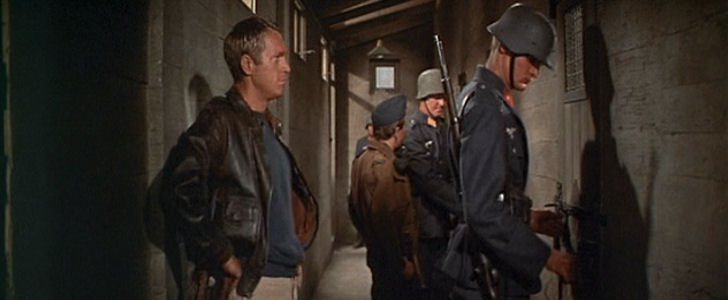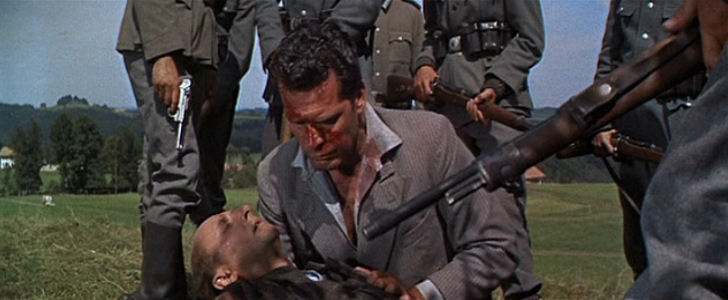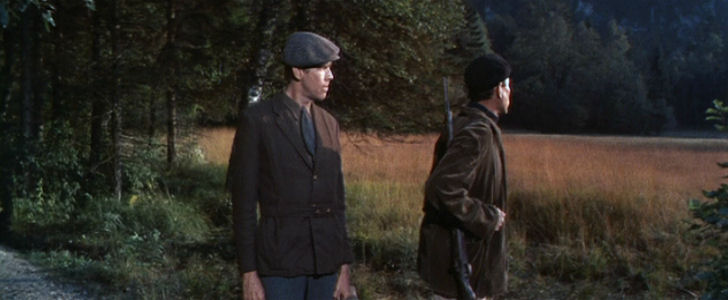BACK-STORY: “The Great Escape” is a WWII prisoner of war movie. It was released in1963 and was a huge hit and has grown in popularity over the years. It is the most famous movie in its subgenre. The film was directed by John Sturges and is based on the nonfiction book by Paul Brickhill. Brickhill was a prisoner in Stalag Luft III and helped with the escape although he was not one of the escapees. His book and the movie are dedicated to the fifty escapees who did not survive. The main screenwriter was James Clavell who spent time in a Japanese prison camp and the book “King Rat”. One of the tunnelers (Wally Floody) served as a technical advisor. Donald Pleasance was a prisoner in Stalag Luft 1 during the war. Steve McQueen insisted the motorcycle scenes be written in and did the stunts, not including the last jump (for insurance reasons).
 |
| Hilts' first trip to the cooler |
SUMMARY: The movie has three distinct parts: the planning and execution of the escape, the escape, and the attempts to reach safety. The first part concentrates on the plan and each main character's role in it. The leader of the escape organization is Roger Bartlett (Richard Attenborough) who is known as “Big X”. He has been warned by the Gestapo that his next attempt will be his last. His plan is to create turmoil in the Third Reich by busting out 250 prisoners. It’s a massive undertaking involving three tunnels. Besides the digging of the tunnels, there are special jobs like forging documents and making disguised clothing. The main characters each have a specialty and gets screen time to demonstrate their prowess. These include the “Forger” Blythe (Donald Pleasance), the “Manufacturer” Sedwick (James Coburn), and the “Scrounger” Henley (James Garner). To break from the “grunt” work of escape preparation, the screenplay adds a cocky American named Hilts (Steve McQueen) to spice things up. He becomes the “Cooler King” for his frequent trips to isolation for insubordination and escape attempts.
The digging of the tunnel is in the hands of Willy (John Leyton) and Danny (Charles Bronson). The movie chronicles the problems and solutions to the tunneling. Example: problem – disposal of all the dirt / solution- bags containing dirt concealed in pants legs and then deposited on the camp grounds. Meanwhile everyone else is doing their job including uncredited actors acting as lookouts to watch for “ferrets” – Germans who tried to discover tunnels.
The tunneling follows a typical Hollywood story arc of smooth sailing, then numerous problems develop, followed by success. The problems start with the discovery of the main tunnel (Tom) while the camp is celebrating the 4th of July with American-made moonshine. A tragic death moves the movie into a darker direction. Some of the problems that now appear include Blythe going blind, Danny developing claustrophobia, and dangerous cave-ins. This leads up to the climactic break-out.
oops, this is not the woods
The buildup of problems culminates in the tunnel being twenty yards short of its destination – the safety of the woods. Hilts rigs up a rope tug system to get the escapees out whenever a nearby guard is not looking. 76 escape before the inevitable screw-up. Luckily, all the main characters were written in as getting out before #77. |
| Blythe dies in Hendley's arms |
CLOSING: Fifty of the recaptured men are executed by the Gestapo/S.S. The lucky ones who are returned to the camp are informed about their comrades. Henley pointedly asks Ramsey if it was worth it (a question the movie does not consider until this brief exchange and based on the underlying vibe definitely answers “yes!” to). Hilts steals one more scene as he is the last to get back. He taunts the ousted commandant and goes to the Cooler for some more throwing a baseball against the wall action.
 |
| one of the three that made it |
RATINGS:
Acting – 9
Action – 7
Accuracy – 8
Realism – 8
Plot – 9
Overall – 9
WOULD CHICKS DIG IT? Although there is not a single female that has a speaking role in it, I would think most women would enjoy it but wonder what all the fuss is about. It is certainly aimed at the male audience (specifically 14 year old boys). However, the actors are appealing and the action is not graphic. It is undoubtedly entertaining.
HISTORICAL ACCURACY: The movie opens with the claim that it is based on a true story, but with composite characters and time compression. It boldly proclaims that every detail of the escape is true. That statement is too strong, but the movie is commendably close to the facts.
There was a Stalag Luft III and the Germans did put all their “bad eggs in one basket”. The attempted escapes on the first day actually occurred in the way depicted. The “X organization” did plan an escape of 250 men involving the construction of three tunnels named Tom, Dick, and Harry. Weirdly, the movie changes the names around for no discernible reason. Harry was actually the one under the stove and Dick was in the washroom. (It was abandoned and used for dirt storage after the Germans cleared the area it was to pop out in.) Tom was discovered by ferrets, but not during a celebration of the 4th of July. There was a moonshine celebration on a different day.
All the activities surrounding the escape are accurate. The forging of papers, disposal of the dirt, making of clothing, creation of the ventilation system, the singing of Christmas carols to hide the sounds of digging, the shoring up the tunnels with bunk bed boards, etc. The movie is extremely strong in depicting how the plan was put into effect.
The escape was essentially like the film shows. The tunnel was twenty feet short of the woods. There was an air raid that shut the lights down for a while. I could find no evidence that a rope was rigged up, but seventy-six men did escape before the exit was discovered by a sentry (probably not because someone fell). It is important to note that none of the seventy-six were Americans. The Americans had been moved to another camp before the escape. Gee, I wonder why the filmmakers decided to leave Steve McQueen and James Garner in the escape?
The third of the film dedicated to the main characters on the lam is substantially Hollywoodized. There was no theft of a plane or a motorcycle, for instance. The movie is close to the truth in its depiction of the success of Sedgwick (actually Dutchman Bram van der Stok) in reaching Spain (although the Resistance drive-by shooting is surely artistic license) and Willy and Danny (Per Bergsland and Jens Muller) stowing away on a ship to reach Sweden. The execution of fifty recaptured men is a fact, but they were not killed in a large group as shown in the movie.
Where the movie takes most of its liberties is in the characters, but it is up front in the composite nature of them. Some are close to a real person like Roger Bartlett representing Roger Bushell. Bushell was the leader of the X Committee and played an essential role in the escape. Ramsey was actually Herbert Massey and he did have a leg injury. Ives (the real Jimmy Kiddell) did die on the wire. Willy and Danny and Sedgwick were differently named and of different nationalities than their counterparts, but their escapes were true. The rest take some creative thinking to determine who they are supposed to be. The important thing is the roles they represent (scrounger, forger, manufacturer, etc.) were real and accurately depicted.
CRITIQUE: I have to be up front about the fact that this was my favorite movie when I was growing up. This was back when I and my brothers got to see it once a year on network TV. That was always a great night in our house. I may have seen it more than any other movie (not counting movies I have shown in class for decades). Sometimes our childhood favorites do not hold up when we watch them through adult eyes. This is not the case with “The Great Escape”. It was and still is one of the classic war movies.
The iconic nature of the film starts with the opening credits as we listen to the stirring theme music which every man of my generation instantly recognizes. Elmer Bernstein wrote the musical score and it is perfect. It dwells in the background of every scene and defines the moods. In this respect, the movie is very similar to another great guy movie – “The Magnificent Seven”. Speaking of which, the two movies also shared Sturges, McQueen, Coburn, and Bronson.
The movie is an expert blend of suspense, action, and humor. The humor works very well. It is dry and used sparingly, but effectively. Some of the lines are memorable. For instance, the ferrets bust in to the washroom and narrowly miss the trap door to Harry being sealed. Danny hustles into the shower and when the guard asks Sedgwick what he is doing there he responds “Watching him. I’m the life guard.”
The camp was constructed near Munich and accurately recreates a Stalag in layout, if not in atmosphere. The tunnel set allows for a cutaway view of the digging. The scenes are truly claustrophobic and the ever present danger of cave-ins adds to the suspense. The scenes outside the camp are authentic-looking since the movie was filmed in Europe. There is even some beautiful Alpine scenery.
The movie does a great job in its structure. The buildup to the escape concentrates on character development and is tutorial on the work that went on. This could have been tedious, but the injection of humor and Steve McQueen keep the narrative flowing. The movie, to its credit does not have a prolonged denouement after the escape. The alternating getaways are deftly juggled and suspenseful. Hilts motorcycle capers dominate, but they are edited such that we have to come back to him at least four times before the famous climactic jump sequence.
The movie ends on a sober note with the murders and the question – was it worth it? However, if ever there were a war movie that is not anti-war, this is it. Life in the camp is portrayed like it would be if you went to a POW fantasy camp. It seems like fun, which it assuredly was not. This is the biggest factor in keeping the movie from being a 10.
Finally, the acting is stellar. Whoever did the casting gets a gold star. The mix of dependable British thespians with cocky Americans is stimulating. This is an actors’ movie. In particular, watch Steve McQueen steal every scene with little eye-catching movements including shameful mugging. His co-stars either had sharing natures or were infuriated. Whatever, McQueen became a superstar based on his performance.
CONCLUSION: You might say I’m prejudiced, but “The Great Escape” is woefully underrated at #44. It is a better movie than its most obvious competitor – Stalag 17 (#18). It has everything that makes a war movie great, in my opinion. It is entertaining. It tells a story that deserves to be told. It teaches. It is accurate enough. It is realistic. Sometimes 14 year old boys are right. This movie rocks!
the famous bike ride
_poster.jpg)

You know how I feel about it.
ReplyDeleteOf course I didn't grow up with it and saw it for the first time this year. While I thought it was in parts entertaining, it's not a proper war movie for me but then you can argue I've reviewed others.. True.
In any case I'd rather watch The Army of Shadows again.
I started wathing Stalag 17 and had to stop it. Maybe I was in the wrong mood but what I saw so far really annoyed me.
I'm not keen on humour in war movies unless it's really black.
I do not see any reason to dispute it being a war movie unless you completely throw out all prisoner of war movies. I know you reviewed "Merry Christmas, Mr. Lawrence" favorably. The Great Escape is certainly as much a war movie as it.
ReplyDeleteI do agree that the movie downplays the bleakness of prison life (I mentioned that in the review), but it is mass entertainment and humor is acceptable.
"Stalag 17" is not as good, but it is a great movie and the second best POW movie, in my opinion.
Some chicks might dig it-if they are fans of Garner and/or McQueen.
ReplyDeleteI did mention the actors were appealing. I should have added that several were sex appealing.
DeleteThis comment has been removed by the author.
ReplyDeleteThis comment has been removed by the author.
ReplyDeleteYou can gripe about the accuracy and the American bias, but it is hard to argue it is not a good movie.
ReplyDeleteJames Garner plays a Canadian. Donald Pleasance IS a Canadian playing a Brit. I know its not much, but American audiences would have rolled their eyes if all the American actors in the movie were playing Canadians. (Steve McQueen from Dummer, Saskatchewan? Give me a break!)
ReplyDeleteIn March 2019, the RAF are planning another event for the 75th anniversary of the Great escape. There will be a screening of the film The Great Escape at London's Eventim Apollo Hammersmith hosted by Dan Snow. It will be screened across UK cinemas.
ReplyDeleteI wish I lived in Great Britain.
ReplyDeleteAs someone who learned about the great escape last year, the murders of those fifty men are one of the prime examples we have of Hitler killing someone directly. I think the best movie portrayal of Hitler is the late Bruno Ganz in Downfall.
ReplyDeleteI agree. See my review.
DeleteOne of the things I loved about "The Great Escape"; Donald Pleasence's performance. It is so nice seeing him play against typecasting as the mild-mannered and good natured Colin Blythe. It is so poignant in the scene where he discovers that he is slowly going blind and is shot by German soldiers because he is unable to see them. The scene where he thanks Hendley for getting him out before he dies, moves me to tears every time. Blofeld and Dr. Loomis aside, Colin was a great role for him.
ReplyDeleteI love the scene where he puts the pin down to try to prove he can see well. Of course, you could argue he was a dick to let Hendley take him.
DeleteIn the final scene of “The Great Escape”, when Ramsey is explaining to Hendley and the returned captured prisoners about the fifty that were murdered, if you look in the background, you can see a visibly-saddened look on Strachwitz's (the tall German guard) face. I always found that a nice touch. It’s like a nice nod to the fact that many of the prison’s guards were aghast by the Gestapo’s actions.
ReplyDeleteNice catch!
DeleteWhen it comes to genre, I personally consider "The Great Escape" more of a prison film than a war film.
ReplyDeleteBy the way, out of note, have you seen the book “The Real Great Escape” by Guy Walters; it was a great read, and while I will always love the fictionalised version in the movie, the real story is just as amazing. I highly recommend it. Maybe you can do a review of it to compare it with the film or what facts you discover?
Prisoner of war films are a solid subgenre of war movies. I have read the book and will someday do a History or Hollywood on the movie.
ReplyDeleteSuch an amazing film; the acting, the story, the music, the feelings. It’s just incredible.
ReplyDeleteFor me this was a case of "had read the book first and had trouble adjusting to the film adaptation." The book does a great job of working with the historical facts while building suspense so the comparatively more action-packed movie put me off - McQueen's motorcycle interlude annoyed rather than thrilled. The movie was still good and has grown on me over time.
ReplyDelete